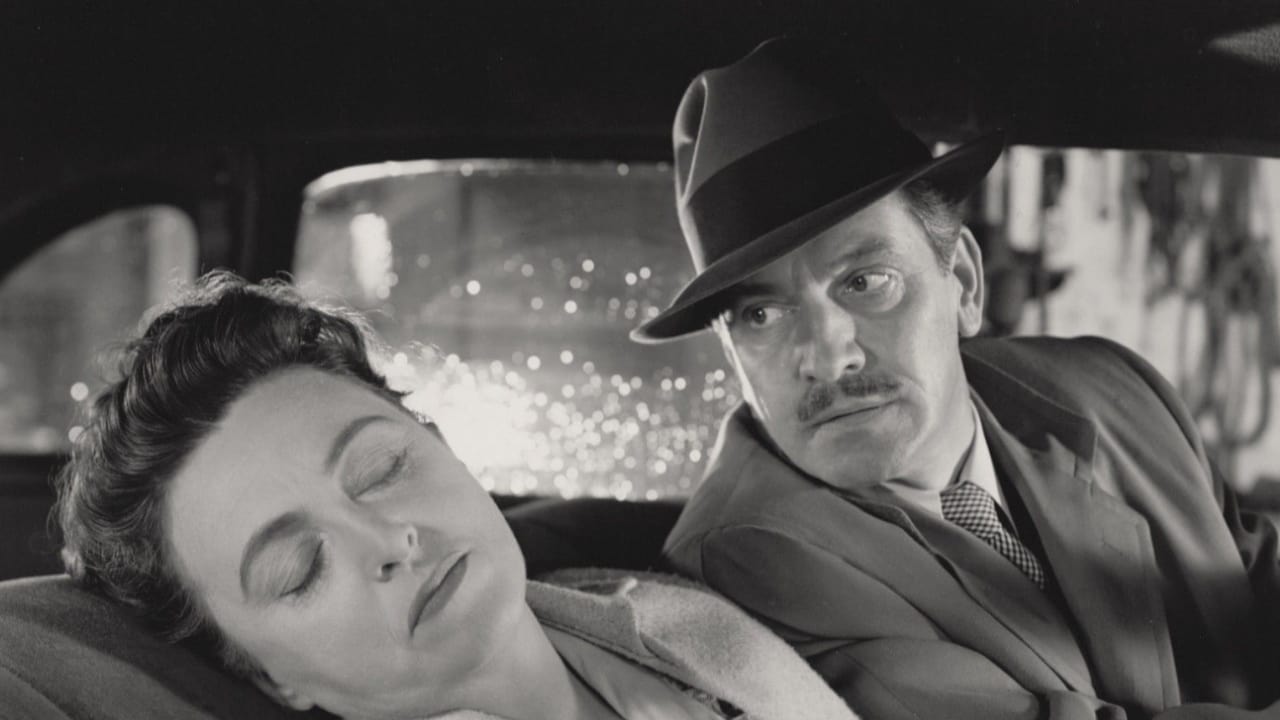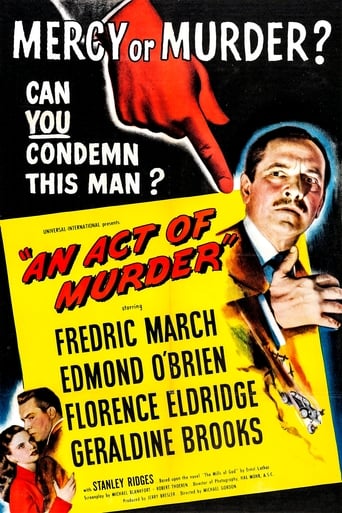

This movie has fine acting, but the real interest is the moral question around which it revolves: can a man kill another to put her out of incurable misery? As you know, that's a question that is still argued, and probably more argued, today than it was, at least publicly, in 1948 when this film was released.The end, where the former letter-of-the-law judge, Frederick March, decides that henceforth he needs to consider intentions as well as actions, is very moving because 1) March was a fine actor, and 2) the background music opens our emotions.But 1) to what extent can the law take intentions into consideration when passing judgment on acts that break the law? 2) Why did the judge not talk about his intentions to end his wife's life with her and with their daughter? I suspect that would have very much weakened his case if it were to be tried today. The point is brought up briefly in one scene between the judge and his daughter near the end, but then nothing is done with it.It's a well-made movie, but it leaves you with unanswered questions that it doesn't do much to help you consider.
... View MoreI watched "An Act of Murder" because I love the actors Frederic March and Edmund O'Brien. Both were Oscar-winning actors who were not exactly handsome (especially as they aged) and managed to give one impressive performance after another over the decades. Sadly, however, despite having two excellent stars, the film lost its momentum towards the end.When the film begins, March plays a tough-as-nails judge and O'Brien a bleeding-heart defense attorney. The two don't like each other all that much--and late in the film, O'Brien's character comes to the judge's defense when he's on trial for a mercy killing. In between is the part of the film I loved most--and which is totally obscured by the ending which is filled with speechifying and some bizarre behavior by March's character. It's a shame, as the idea of mercy killing and medical ethics are really interesting topics and it's pretty amazing to see them talked about in the 1940s, as usually films deliberately avoided this back in the day.
... View More***SPOILERS*** One of if not the first film out of Hollywood that tackles the subject of mercy killings that has honorable and straight laced, in going by the book, Judge Calvin Cooker, Fredic March,come to realize that there are extenuating circumstances in cases that he presides on that is not explained in the law that he's sworn to upholds. This comes crashing down on his head when his wife Catherine, Florence Eldridge, is diagnosed with a fatal brain disease that will slowly end her life, with her brain turning into mush, in excoriating pain. It's later in the movie when the Judge can't take it, his wife's suffering, anymore that in a fit of madness drives his car with his wife Catherine in it off the road where she ends up dead and him suffering severe head shoulder & leg injuries!Even though exonerated in Catherine's dead Judge Cook feels that he in fact murdered her and wants to pay for his crime even if it meant life imprisonment or worse. Having attorney David "Double D" Douglas, Edmond O'Brien, given the job to defend Judge Cook , who refused to defend himself, it's decided the only defense for his action is an insanity defense in that he wasn't in his right mind at the time of the crime that he's not only accused of but admitted to! It takes a lot of work on "Bouble D's" part to not only convince the judge & jury but himself as well to Judge Cook's innocence. In that the man, Judge Cook, was out of his mind at the time of his wife's death but it wasn't him that killed her! It turned out that Catherine herself was the one who did herself in before her husband Judge Cook had the chance to do it!***SPOILERS*** It was Catherine who found out the truth of her fatal illness in going through her husbands papers and knowing what she's in store for, a slow and painful death, that she decided to put herself, in taking a bottle of powerful pain killers, out of her misery. In an autopsy preformed on her on the insistence of Judge Cook's attorney David "Double D" Douglas reviled that Catherine was in fact dead before the car that her husband drove off the road hit the bottom of the gully that it landed in! The ending of the film was a bit of a cop-out in having Judge Cook not going through with his planned mercy killing of his terminally ill wife. But with the movie released in 1948 him really going through with it and being found innocent was totally unthinkable at the time by the movie going public.In fact there was an even more poignant moment in the film a bit earlier when a man's best friend, his dog, was hit by a car and was, as his owner was in tears, mercifully shot and killed by a policeman at the scene. It was that tragic incident that gave Judge Cook the idea to do the same thing, in a car crash, to his wife to keep her from going through the same kind of suffering that the fatally injured canine was going through!
... View MoreFascinating Film that Daringly Approaches the Subject of Euthanasia. In Doing so it also has Liberal Elements Inserted about the Rigid Judicial System that has a Tendency Toward Antiquated ("Powdered Wigs") by the Book Procedures.Edmond O'Brien is the Lawyer that Questions a Hard-Boiled Judge, while Dating His Daughter. The Judge Played by Fredric March goes through a Tumultuous Time Dealing with His Wife's Terminal Illness. But the Acting Accolades must go to Florence Eldridge who Gives a Riveting Performance.This Thoughtful Piece of Social Commentary is Rich and Rewarding with Taut and Suspenseful Scenes that can at Times be Heartbreaking. This is an Odd Movie to be Sure, and is Well Worth a Watch for its Genuine Concern about Troubling Things that are Rarely Discussed (especially in 1948), but Linger on the Fringe of Everyday Life.
... View More